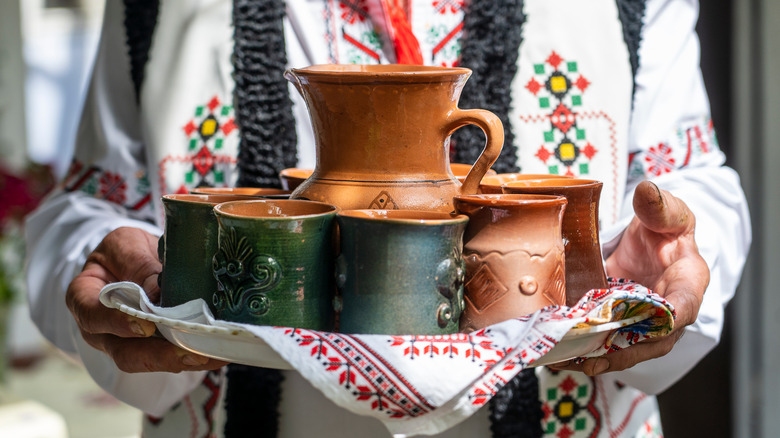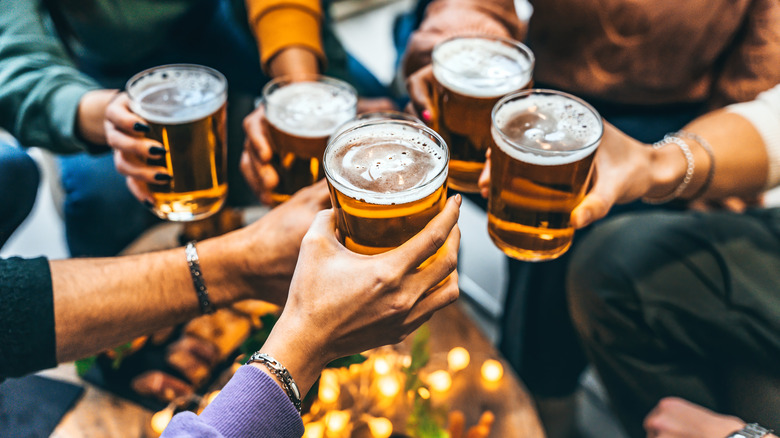This Country Drinks More Alcohol Than Any Other In The World
Alcohol consumption varies hugely around the world: Residents of some countries (often where alcohol is illegal) drink effectively none of it, while a number of countries, many in Europe, drink over 10 liters (2.6 gallons) of it per year. That's measured in terms of the amount of pure alcohol that the average person drinks annually — not the volume of alcoholic beverages consumed.
According to a World Health Organization report from 2018, the country that drinks the most is Moldova, in Eastern Europe. The average Moldovan drinks 15.2 liters of pure alcohol per year, or a fraction over 4 gallons. (For comparison, a standard 12-ounce beer can contains just 0.6 ounces, or 17mL, of pure alcohol.) But the country's alcohol consumption is very gendered: According to the same report, the average Moldovan man drinks 25.2 liters of pure alcohol annually, compared to just 6.2 liters for women. Wine is the most popular beverage, making up 56.6% of consumption, compared to 25.2% and 16.2% for spirits and beer, respectively.
Moldova isn't an outlier, and there are definitely other countries with similarly high consumption: The same report suggests that Lithuanians are next on the list, drinking an average of 15 liters annually, followed by Czechia at 14.4 liters. Bear in mind that these are just averages: The statistics are an average calculated from a mix of people that likely includes non-drinkers and individuals who drink far beyond that average.
Why it's hard to calculate alcohol consumption
Calculating how much people drink across an entire country isn't an easy task: Besides the fact that these numbers are usually averages, researchers have noted a bunch of challenges to gathering data about alcohol consumption. For example, different countries have differently-sized drinks, and because this data is often collected by surveys where people report how much they drink, the information they provide may be flawed. They might say they drank more or drank less than reality, or they might not even be able to measure accurately (after all, different bars will pour different amounts of alcohol in mixed drinks).
For these reasons and others, statistics about how much a country drinks tend to vary. While the WHO report here ranks Moldovans as the biggest alcohol consumers, another study (only of Europe) places the country third, and notably, with about two liters less of alcohol consumed per person, per year. Data from the CIA gives a whole different answer, placing the Cook Islands at the top, with Moldova ranked at 54. Of course, it varies over time: Other statistics from the WHO place Belarus (also in Eastern Europe) at the top. That said, if you compare different statistics, it's often similar countries ranked as home to the heaviest drinkers, and mostly European countries: Latvia, Lithuania, Czechia, France, Ireland, Germany, and Austria often appear towards the top of such lists. Outside Europe, some other heavier-drinking countries include Nigeria, the Seychelles, New Zealand, Australia, South Korea, and Uruguay.
Concerns around heavy drinking in a country
When a country has a high level of alcohol consumption, it certainly doesn't inherently mean that it's a sign that the country is simply festive or likes to party. Alcoholism is a serious problem in many such places, and there's a wide range of social and cultural factors that can lead to it. The causes and effects aren't always crystal clear: For example, there's known to be a connection between unemployment and alcoholism, but whether one causes the other or whether there's a more complicated connection is up for debate.
There are certainly documented problems with alcoholism in Moldova, with one in four deaths having a link to alcohol. The factors are complex, with the country facing economic difficulties while also retaining a large wine industry and culture around it. The country has put laws in place to try to reduce alcohol consumption (for example, by restricting advertising), and has had some success with a crackdown on drunk driving.
Other countries have had similar problems: Lithuania, often ranked as a heavier-drinking country, had similar health problems and excessive deaths from a culture of binge drinking. Yet it's had some success by changing laws, for example, to restrict the times alcohol may be sold — proving that even if a country is ranked as a heavy consumer of alcohol, it's not destined to stay that way forever.


